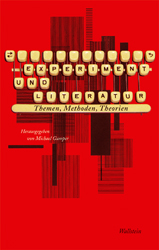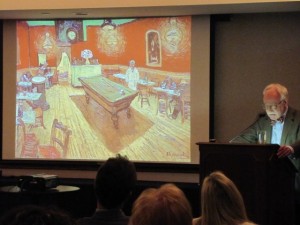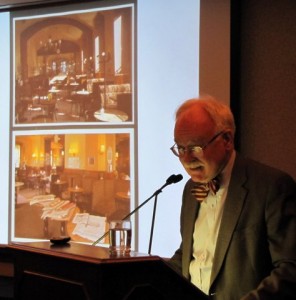
Leo Lensing took part in a celebration of the 75th birthday of Friedrich Pfäfflin, held on December 11, 2010, at the Akademie für gesprochenes Wort in Stuttgart. Pfäfflin, the former director of the Schiller Nationalmuseum and, for many years, the editor of the catalogues and “Marbacher Magazine” of the Deutsches Literaturarchiv, was honored with a festive evening that featured a small exhibition from his Karl Kraus collection and a fine menu based on Kraus’s favorite dishes.Lensing and other friends and colleagues – Kurt Krolop (Prague), Christian Wagenknecht (Göttingen), Jens Malte Fischer (Munich) and Joachim Kalka (Stuttgart)- gave brief talks on manuscripts that were present in the exhibition.
 Leo Lensing and the honoree Friedrich Pfäfflin
Leo Lensing and the honoree Friedrich Pfäfflin
 The Rilke specialist Joachim Storck and Leo Lensing in a friendly exchange about the relationship between Rilke and Karl Kraus
The Rilke specialist Joachim Storck and Leo Lensing in a friendly exchange about the relationship between Rilke and Karl Kraus
 In the latest issue of Wesleyan’s online newsletter, Krishna Winston, Marcus L. Taft Professor of German Language and Literature, dean of arts and humanities, answers “5 Questions” on the art of literary translation. Winston has been the principal English-language translator for the works of the Nobel Prize-winning German author Günter Grass since 1990. Here Winston talks about the art of translation and working with a giant of 20th-century literature.
In the latest issue of Wesleyan’s online newsletter, Krishna Winston, Marcus L. Taft Professor of German Language and Literature, dean of arts and humanities, answers “5 Questions” on the art of literary translation. Winston has been the principal English-language translator for the works of the Nobel Prize-winning German author Günter Grass since 1990. Here Winston talks about the art of translation and working with a giant of 20th-century literature.
 Ulrich Plass and Arne Höcker together compiled and introduced the newest issue of the prestigious Zeitschrift für deutsche Philologie. The title of this issue is Die Einrichtung der Literatur, which, on the one hand, refers to literature as an institution and to the institutionalization of literature, and, on the other hand, carries the meaning of the interior design and the furnishings of literature. The interest of the volume is to provide a contribution to the research of the processes and techniques of writing under the conditions of modernity, to shed light on the modern scene of writing understood as an “unstable ensemble of language, instrumentality and gesture” (R. Campe). With the focus on furniture, the volume draws particular attention to the material side of the project of literature, which contributes to its success, or – in the case of modernity – to the successful exhibition of its failure.
Ulrich Plass and Arne Höcker together compiled and introduced the newest issue of the prestigious Zeitschrift für deutsche Philologie. The title of this issue is Die Einrichtung der Literatur, which, on the one hand, refers to literature as an institution and to the institutionalization of literature, and, on the other hand, carries the meaning of the interior design and the furnishings of literature. The interest of the volume is to provide a contribution to the research of the processes and techniques of writing under the conditions of modernity, to shed light on the modern scene of writing understood as an “unstable ensemble of language, instrumentality and gesture” (R. Campe). With the focus on furniture, the volume draws particular attention to the material side of the project of literature, which contributes to its success, or – in the case of modernity – to the successful exhibition of its failure.
Ulrich Plass’s article “Schreibpult, Lampe, Uhr” examines Eduard Mörike’s poetic techniques of writing in the context of a world of disenchanted objects. It compares those of Mörike’s thing-poems that address pieces of furniture. Three aspects are of central concern: the relationship between text and title; the inclusion of the seemingly absent observer into the thing-space of the poem; the technique of inscription as potential dissolution of the rigid duality of frame and framed object. The latter, however, falls short in determining the inscribed object and instead leads to an intertextual opening of the text.
Arne Höcker’s contribution “Artistische Dinge oder Wie man lyrische Gedichte macht” analyzes Gottfried Benn’s scene of writing. In a short autobiographic prose piece from 1952, Benn condenses his writing scene to the technical formula of three desks. Against the backdrop of the artistic program that Benn developed in his famous lecture „Problems of Lyric Poetry“ a year earlier, the article focuses on the instrumental techniques of writing, in which artistic things are shaped and formed and can realize themselves as lyric poetry.
The complete table of contents is available at the journal’s website.
 Krishna Winston’s translation of Günter Grass’s The Box: Tales From the Darkroom (published by Houghton Mifflin Harcourt) was recently reviewed in the New York Times Sunday Book Review.
Krishna Winston’s translation of Günter Grass’s The Box: Tales From the Darkroom (published by Houghton Mifflin Harcourt) was recently reviewed in the New York Times Sunday Book Review.
The Goethe-Institut New York is pleased to invite applications for the first Frederick and Grace Gutekunst Prize for Young Translators. The purpose of the prize is to identify and encourage outstanding students of translation and of the German language and assist them in establishing contact with the translation and publishing communities.
The prize, which comes with a cash award of $2,500, is open to all college students and translators under the age of 35 who, at the time the prize is awarded, have not yet published nor are under contract for a book-length translation from the German. Applications will be accepted only from candidates who live in the United States.
To get more information and to find out how to participate, please follow this link:
 Uli Plass and Arne Höcker organized two panels on “The Scene of Writing, Non-Writing” at last week’s Conference of the German Studies Association in Oakland. The panels examined the “scene of writing, non-writing” as the writing scene that constitutes the law of modern literature insofar as it refers to a crisis of writing in which questions of authorship and subjectivity return to the foreground. Arne Höcker’s talk focused on Adalbert von Chamisso’s 1814 novella of Peter Schlemihl (the man who sold his shadow); Uli Plass discussed the two recent books by Rainald Goetz (“Klage” and “Loslabern”).
Uli Plass and Arne Höcker organized two panels on “The Scene of Writing, Non-Writing” at last week’s Conference of the German Studies Association in Oakland. The panels examined the “scene of writing, non-writing” as the writing scene that constitutes the law of modern literature insofar as it refers to a crisis of writing in which questions of authorship and subjectivity return to the foreground. Arne Höcker’s talk focused on Adalbert von Chamisso’s 1814 novella of Peter Schlemihl (the man who sold his shadow); Uli Plass discussed the two recent books by Rainald Goetz (“Klage” and “Loslabern”).
 Arne Höcker’s article on Scientific Authorship appeared in the compendium Experiment und Literatur. Themen, Methoden, Theorien (ed. Michael Gamper, Wallstein Verlag). The compendium discusses topics, methods, and theories for the analysis of the relations of literature and scientific experiments, and focuses particularly on epistemological and poetological dimensions of the exchange between literature and the sciences. Arne Höcker’s contribution discusses problems of authorship in scientific discourse in regard to questions of scientific creativity, authority, and copyright.
Arne Höcker’s article on Scientific Authorship appeared in the compendium Experiment und Literatur. Themen, Methoden, Theorien (ed. Michael Gamper, Wallstein Verlag). The compendium discusses topics, methods, and theories for the analysis of the relations of literature and scientific experiments, and focuses particularly on epistemological and poetological dimensions of the exchange between literature and the sciences. Arne Höcker’s contribution discusses problems of authorship in scientific discourse in regard to questions of scientific creativity, authority, and copyright.
… of today’s FAZ (Frankfurter Allgemeine Zeitung Nr. 220, 22. September 2010):
Leo A. Lensing’s article on Karl Kraus in “Fotogeschichte” (see earlier post) inspires the German Professor Martin Stingelin to write about the use of photographies by Karl Kraus: “Echt medial”
On the same page:
the review of the conference “Die amerikanischen Götter”. Transatlantische Prozesse in der deutschsprachigen Popkultur seit 1949, to which Uli Plass contributed a talk titled “Totalschaden: Zur Dialektik von Adornos Pop-Kritik” last weekend at the University of Freiburg/Breisgau.
Here it is (on one page):
Hans Jonas, Memoirs (Brandeis UP, June 2008)
Peter Handke, Crossing the Sierra de Gredos (Farrar, Straus, Giroux, April 2009)
Peter Handke, Don Juan: His own Version (FSG, Feb. 2010)
Werner Herzog, Conquest of the Useless (HarperCollins paperback, June 2010)
(Here is a New York Times review of this book)
And coming on Nov. 10, 2010:
Günter Grass, The Box (Harcourt)

Arne Höcker’s article on the prison chaplain appeared in a German anthology on “The Figure of the Third”. His article reconstructs a transformation in historical discourse and practice within the penal system around 1900. It investigates the constitutive role of the prison chaplain for the creation of knowledge about “the criminal”.
On May 8, we came together to honor our students and to celebrate the end of the academic year.
Here are some pictures:
Heather Stanton ’10, who is about to graduate with a double major in History and German Studies, presents her Honor-Thesis “Where German Hearts are Molded: Historical Memory and State Legitimation in the German Democratic Republic, 1945-1989.”
The chair of the German Studies department Leo Lensing awards prizes to our students:Linnea Damer ’10 won the Scott Prize, Heather Stanton ’10 won the Prentice Prize, and James Gardner ’13, Matt Alexander ’12, and Katherine Wolf ’12 the Blankenagel Prize. Adam Rashkoff ’13, Adrian Rothschild ’12, and Catherine Doren ’13 received the annual Book Prize presented by the Department of behalf of the German Consulate in Boston.
Iris Bork-Goldfield was honored for being an enthusiastic teacher, a great thesis-advsisor for Heather Stanton’s Honor Thesis, and not at least a wonderful colleague.
From left: Helen Reeve, Jerry Wensinger, and our colleague and Dean of the Arts and Sciences, Krishna Winston; in the background: Matthew Alexander.
From left: our students Anya Olsen and Catherine Doren, in the background: Matthew Alexander.
And now, we wish our seniors a wonderful and happy commencement, and everyone a joyful and sunny summer!!!
On March 19, Leo A. Lensing gave a lecture at the Embassy of Austria on
Demolition Man: Karl Kraus and the “Deconstruction” of the Coffeehouse Myth
No other great culture is as intimately associated with the coffeehouse milieu as what has come to be known as “Vienna 1900,” the era of Freud and Wittgenstein, of Klimt and Schiele, of Schnitzler and Hofmannsthal, of Adolf Loos and Josef Hoffmann. Yet the Viennese coffeehouse was not merely an architectural project, an actual meeting place or a literary topos. It often represented a hotly contested “marketplace of ideas.” Karl Kraus, whom many consider the greatest satirical writer of the 20th century, undoubtedly enjoyed the sociability and intellectual exchange fostered by the coffeehouse. But he also viewed this typically Viennese institution as a symbolic location of dubious reputation. The coffeehouse figures in his work – from the early satirical sketch. A Literature Demolished, which took its inspiration from the razing in 1897 of the famous Café Griensteidl, to his great anti-war drama The Last Days of Mankind (1922) – as an often comic stage upon which cultural superficiality and ideological corruption reveal themselves.
Viennese coffeehouse was not merely an architectural project, an actual meeting place or a literary topos. It often represented a hotly contested “marketplace of ideas.” Karl Kraus, whom many consider the greatest satirical writer of the 20th century, undoubtedly enjoyed the sociability and intellectual exchange fostered by the coffeehouse. But he also viewed this typically Viennese institution as a symbolic location of dubious reputation. The coffeehouse figures in his work – from the early satirical sketch. A Literature Demolished, which took its inspiration from the razing in 1897 of the famous Café Griensteidl, to his great anti-war drama The Last Days of Mankind (1922) – as an often comic stage upon which cultural superficiality and ideological corruption reveal themselves.


Jason Kavett ‘09 and Andrew Kirwin ‘09, who graduated with a major in German and COL last year, are going to pursue their careers in German Studies as graduate students at Yale University. After having received offers from prestigious German programs at Harvard, Princeton, Columbia, Berkeley, Hopkins or the University of Chicago, both Jason and Andrew decided to stay close to their Alma Mater in Middletown (although, the excellence of Yale’s German Department might also have influenced their decision).
Congratulations to Jason and Andrew!

Leo Lensing’s new article
“Lebensstarre” – Bewegende Bilder: Fotografien und ein Film in Die letzten Tage der Menschheit von Karl Kraus
has been published in the latest issue of “Fotogeschichte” (115/2010).